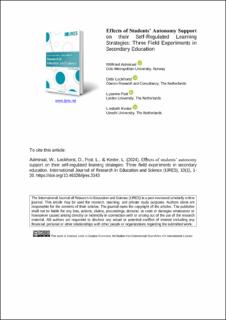Effects of students’ autonomy support on their self-regulated learning strategies: Three field experiments in secondary education
Peer reviewed, Journal article
Published version
Permanent lenke
https://hdl.handle.net/11250/3118861Utgivelsesdato
2024Metadata
Vis full innførselSamlinger
- Publikasjoner fra Cristin [3269]
- SPS - Documents [424]
Originalversjon
International Journal of Research in Education and Science. 2024, 10 (1), 1-20. https://doi.org/10.46328/ijres.3343Sammendrag
Providing students with autonomy over their learning process can support the development of their self-regulation skills. This study aimed to examine the effects of autonomy-support interventions on students’ self-regulated learning strategies. The participants were 432 students from three secondary schools in the Netherlands. In each school, a one-year field experiment was performed, in which teachers and students shared control over learning processes. At the start and end of the school year, students from both the experimental and control conditions completed a questionnaire on perceived autonomy support and self-regulation strategies used. Univariate analyses of covariance were performed to examine the effects of the interventions on perceived autonomy support and the use of self- regulated learning strategies. The intervention with the highest amount of student control showed positive effects on self-regulated learning strategies ‘task orientation’, ‘planning’, and ‘process evaluation’, although it did show a small decrease in perceived autonomy support. The other two interventions showed an increase in perceived autonomy support and a positive trend in ‘monitoring’. The field experiments suggest that different ways of supporting student autonomy can yield different effects on students’ self-regulated learning strategies. The tentative conclusion is that a focus on student control is the most effective.

